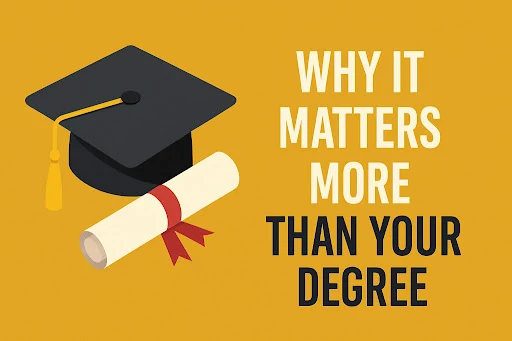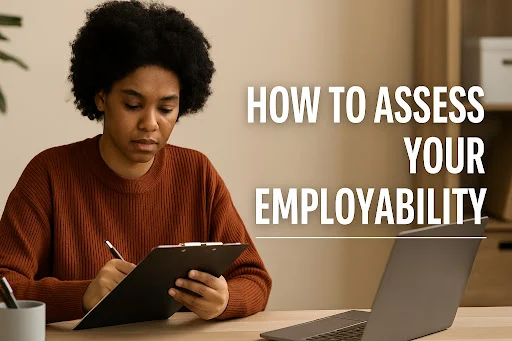Key Takeaways
- Employability is Your ability to earn, not just get hired.
- Most schools ignore the real skills that matter: communication, adaptability, digital tools.
- You don’t need permission or perfection to start—just clarity and practice.
- Skills can be built for free using online tools, real-life tasks, and personal projects.
- Just Waiting for a job will keep you stuck.
THEY LIED TO YOU ABOUT SUCCESS
You followed the rules. You studied hard. You graduated. And now? You’re broke, frustrated, and invisible in the job market.
You were told your degree would open doors. But the truth is, you’re not underqualified—you’re just unprepared for how the world really works.
Companies want problem-solvers, not paper chasers. Clients want creators, not credentials. The system is failing millions of smart young people across Africa, South Asia, Latin America and the world—and no one told you why.
So let’s talk: What does it really take to become employable today—and how can you start before it’s too late?
Table Of Contents
- What Are Employability Skills?
- Types of Employability Skills
- Why It Matters More Than Your Degree
- The Scholars' Psychology
- Same Degree. Different Outcome
- Personal Employability Assessment (Free Tool)
- How to Build Employability Daily
- Lies About What Makes You Employable
- Wait For A Call Or Answer Your Own
WHAT ARE EMPLOYABILITY SKILLS?
Employability skills are the life-and-money skills that make you valuable—whether you work for a company, a client, or yourself.
They’re not just what you know. They’re what you can do—and how you show up under pressure.
These are the skills that earns you money in the real world. In
FatCat Culture, we call this “
The Trump Card.”
TYPES OF EMPLOYABILITY SKILLS
A. Soft Skills (People + Thinking)
- Communication (written, verbal, digital)
- Emotional Intelligence (EQ)
- Critical Thinking & Creativity
- Teamwork & Collaboration
- Adaptability & Growth Mindset
B. Hard Skills (Tools + Techniques)
- Digital Literacy (Excel, Canva, ChatGPT, Notion)
- Basic Design, Coding, Data skills
- Research & Presentation tools
- Social media & Content creation
C. Business & Entrepreneurial Thinking
- Problem-Solving
- Decision-Making
- Customer Understanding
- Time and Task Management
WHY IT MATTERS MORE THAN YOUR DEGREE
A degree shows you studied, but skills show you can actually deliver. In a world with many graduates and very few jobs, what matters now is:
- Can you Sell ideas or negotiate well?
- Can you Manage tasks and meet deadlines?
- Can you Lead teams, online or in-person?
- Can you Learn new things on your own?
- Can you Solve problems creatively?
- Can you Communicate and work well with others?
- Can you Use basic tech or AI tools?
Degrees matter for some jobs, but skills matter more for most. If your degree is not backed by skills, it’s just paper.
Why do we ignore skills and go for degrees instead?
Fear: Skills like coding or selling feel risky. Degrees feel safe.
Need for praise: We want certificates to show off, not just results.
Following the crowd: We get degrees to match peers or to please family members. Everyone gets degrees, so we do too—until hard times hit.
Avoiding loss: We fear wasting time or money on skills without sure jobs.
Overconfidence: We think a degree alone makes us ready for work.
Degrees matter for jobs like medicine or law, but skills rule most fields. The job market is changing fast!
Are you choosing struggle that feels safe—or growth that feels scary?
SAME DEGREE. DIFFERENT OUTCOME
Kofi and Lizzo graduated from the same university. Studied the same course, business administration. Same year. Same CGPA.
Kofi believed the degree was enough. He polished his CV, prayed, and started applying everywhere—from banks to NGOs. But he never learned Excel. Didn’t touch Canva. Didn’t know how to pitch or interview well.
A full year passed. Still jobless. His inbox was full of “We regret to inform you...”
Lizzo, on the other hand, used her final year to prepare. She learned digital tools, took short courses in data analysis and communication, and practiced solving real problems for student clubs.
Two months after graduation, she was hired by a remote startup—and now mentors others on LinkedIn.
The degree was the same. What changed was what they did with their time. In today’s world, school is the starting line—not the finish line.
HOW TO ASSESS YOUR EMPLOYABILITY
Want to know if you're actually employable—or just educated? Ask yourself these questions:
1. Can I clearly explain my value in 30 seconds?
2. When was the last time I solved a real-world problem (not an exam)?
3. Do I know the tools employers use in daily activities (Excel, Canva, ChatGPT)?
4. Have I created anything I can show—like a portfolio, blog, or digital project?
5. Do I have any soft skills proof—public speaking, leadership, conflict resolution?
HOW TO BUILD YOUR SKILLS DAILY
Step 1: Start With ONE Skill
- Pick one skill based on your rating.
Step 2: Find Free Tools
- YouTube tutorials
- ChatGPT walkthroughs
- Google Suite practice docs
Step 3: Create Mini Tasks
- Design a CV, write a sales pitch, make a simple Canva flier, lead a Zoom meeting.
Step 4: Practice in Public
- Post your skill journey
- Share samples with friends
- Ask for feedback in FatCat Community
Step 5: Track Your Growth
- Document it with screenshots, short videos, blog posts
- Build a digital portfolio (even on Google Drive)
Step 6: Repeat with Another Skill
- Once one becomes natural, stack the next.
LIES ABOUT WHAT MAKES YOU EMPLOYABLE
1. I Need A Job To Learn Skills: You need skills to get a job.
2. I’m Too Late: Some people started last month and are ahead of you.
3. Soft skills are for extroverts: They’re for anyone who wants to succeed.
4. Employability means working for others: It means being useful—anywhere.
> “My uncle said I should just pray and wait.” – Waiting is not a strategy. God blesses those who move.
WAIT FOR A CALL… OR ANSWER YOUR OWN.
There’s no shame in being broke. The shame is staying there when tools are free and stories are shifting. This world belongs to creators, solvers, doers.
You don’t need a seat at the table. You need to learn how to build your own. So what’s your next move?
Because working hard without clarity isn’t noble—it’s dangerous.
Welcome to FatCat Culture! Your growth is our movement. Let’s build together. We'd love to know your thoughts in the comments. Follow us on social media for amazing updates, finance tips, quotes and more! See you soon 🥰
Tools, Apps and Resources
Explore our Glossary











Comments
Post a Comment
🤝 Hey friend, your voice matters—say hi or share your story below.